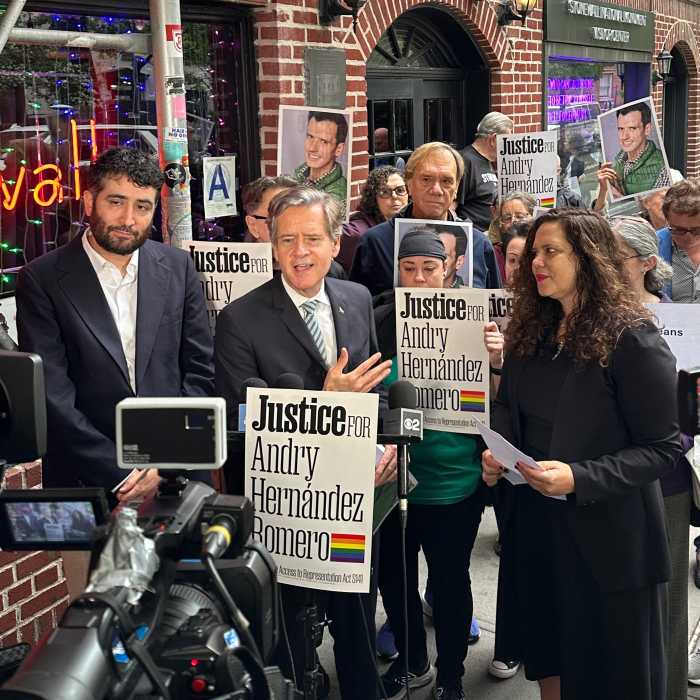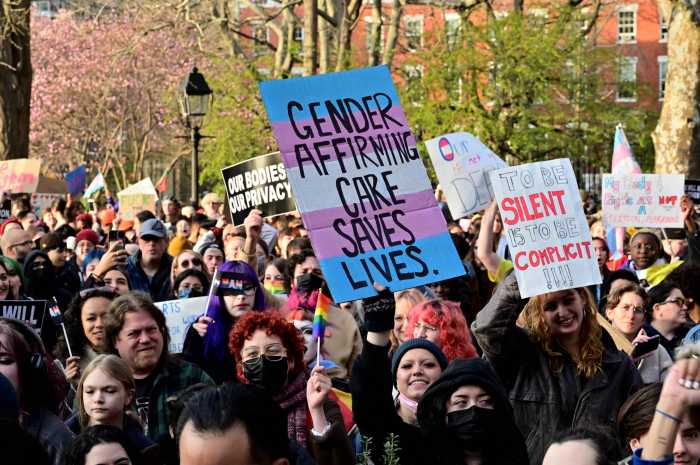In an historic first for the country considered the most Catholic in Europe, Krystian Legierski became Poland’s first openly gay elected official when he was elected to Warsaw’s City Council in country-wide municipal elections on November 21.
Not only is Legierski, a 32-year old lawyer, entrepreneur, gay activist, and Green Party leader, a well-known figure in the Warsaw gay community, he is also black.
“My father was from Mauritania,” Legierski told Gay City News by telephone from Warsaw, “and came to Poland in the early ’70s to attend a maritime academy for training to join the merchant marine, which is when he met my mother.”
Son of a Mauritanian father, Krystian Legierski is Poland’s first out elected official
But the biracial relationship didn’t last long, and his father split and returned to Mauritania (officially, the Islamic Republic of Mauritania, a country in western North Africa bordered by Algeria, Senegal, and Mali.)
Legierski, who uses his mother’s maiden name, said he has never had contact with his father.
Legierski's victory was all the more remarkable because, just three years ago, the European Parliament in Strasbourg overwhelmingly passed a resolution condemning “the emerging climate of racist, xenophobic, and homophobic intolerance in Poland” under the gay-baiting Kaczynski twins — Lech, that nation’s president from 2005 until April of this year, when he died in a plane crash, and Jaroslav, who was prime minister in 2006 and 2007.
Legierski was elected under proportional representation as a Green candidate on a coalition ticket led by Poland’s Social Democratic Party from a Warsaw district he describes as “rather upscale and conservative.” In the new 60-member City Council, the conservative Civic Platform party of Prime Minister Donald Tusk will have 33 seats, the intensely homophobic and ultra-nationalist Law and Justice Party — founded by the Kaczynski brothers — will have 17 seats, and the left opposition, of which Legierski is a part, will have ten seats.
It was only four years ago that the City Council, then led by the Kaczynskis, ordered the closing of Legierski’s celebrated nightclub, Le Madame, which began as a gay venue but grew into a vibrant rainbow gathering place for every sort of sexual, political, and cultural ferment emerging in Warsaw. When police raided the club in March of 2006, the hundreds of customers inside refused to leave, and there began a siege of the club in order to close it that became a milestone in the history of the gay rights struggle in Poland (see this reporter’s April 6, 2006 article, “A Polish Stonewall”).
Warsaw began an annual tradition of Gay Pride marches in 2001, but in 2005, Lech Kaczynski, then the city’s mayor, banned the event. Two years later, in a landmark ruling, the European Court of Human Rights in Strasbourg held that the ban was illegal under international treaties to which Poland is a signatory.
This April, when the annual Europride march was held in Warsaw, it attracted less than 15,000 participants — a sharp contrast to the half-million who joined the 2007 event in Madrid, the 45,000 who participated in the 2008 Europride in Stockholm, or the 50,000 at 2009 Europride in Zurich (which has a lesbian mayor).
“This year’s Europride here in Warsaw had only about 13,000 marchers,” Legierski told Gay City News, “and they were all mostly activists. The other Europrides had lots of people who came just for fun, but Poland’s reputation for homophobia didn’t make it that attractive for just fun-seekers.”
Warsaw Europride was protected by 2,000 police, who kept a wide gap between march participants and an organized gang of hundreds of right-wing Catholic and neo-Nazi youth, who unleashed a rain of eggs, rocks, and fire rockets into the parade.
Although homophobia is still widespread and virulent in Poland, Legierski's victory is a sign that attitudes are beginning to change.
The new openly gay City Council member said his election campaign was relatively free of any gay-baiting or racist backlash.
“There was a little something about my being gay,” Legierski told Gay City News, “but it was not a strong attack. And being black is not a problem in Warsaw or even in Poland,” undoubtedly because there are hardly any blacks in the country.
Legierski said that media coverage of his remarkable victory was “mostly positive; it was cool. Yes, there were a few homophobic comments posted by readers on the websites of some of the newspapers, but on the whole the coverage was something positive,” another sign of change.
“All the television stations covered my victory, and they’ve all invited me to appear on their talk shows — except for the TV station controlled by the Kaczynskis,” he added.
The Kaczynskis’ Law and Justice Party suffered a serious setback when it was defeated by Tusk’s Civic Platform in the 2007 parliamentary elections and Tusk replaced Jaroslav Kaczynski as prime minister. But, Legierski noted, the only real change in the government’s attitude toward gays has been the absence of the overt homophobic rhetoric and policy initiatives that characterized the Kaczynskis’ reign.
Under the Kaczynskis, for example, there were initiatives to ban homosexuals from teaching in the public schools, and there was an incessant rain of homophobic declarations from cabinet members and the prime minister, who condemned homosexuality as “unnatural” behavior that the state must prevent from “infecting” others.
“Tusk and his people may have stopped using hate language against us,” Legierski told this reporter, “but they still think gays are not normal, and we can’t get anything positive from them.”
In September, Tusk’s minister for Equal Treatment, Elzbieta Radziszewska, claimed in an interview in the Catholic weekly Gość Niedzielny that private Catholic schools could refuse to hire a lesbian as a teacher, despite the fact that the Polish Labor Code bans discrimination based on sexual orientation.
In a televised debate on this issue with Krzystof Smiszek of the Polish Society of Anti-Discrimination Law (PSAL), she publicly disclosed his sexual orientation and accused him of being biased, saying, “We know that he is a member of the homosexual society and an activist for the Campaign Against Homophobia and it’s no secret who his partner is…”
Poland’s Campaign Against Homophobia (KPH) denounced the minister’s statement, saying, “We are deeply astonished by the words of Radziszewska. Firstly, her views on anti-discrimination law are not in line with Polish law or European standards of equal treatment. This raises serious concerns of her competence to hold her position.”
The gay group continued, “Furthermore, Radziszewska commented on Smiszek’s sexual orientation in a debate which was in no way connected to his person. Therefore, it is evident that she was attempting to discredit him by capitalizing on homophobia. We find this particularly deplorable for a politician of her ranking, and even more so coming from someone who is entrusted with ensuring equal treatment in the country.”
Despite the lack of sympathy from Prime Minister Tusk and his ruling Civic Platform party, Legierski said that the next big item on the gay agenda will be the introduction of a gay and lesbian domestic partnership act in Parliament next year.
“Even if it doesn’t pass, the important thing is to create public discussion,” Legierski said. “If attitudes in this country are beginning to change, it’s because we’ve become more and more visible, and we can educate people if we explain what the domestic partnership project is and why it is needed.”
Legierski said he first began to come out “when I was 14 or 15, and I realized I just wasn’t interested in girls, so I began discussing this with my friends.”
He came out in public when he had left the small town in conservative southern Poland where his mother lived and went to university in Warsaw.
“There was a magazine that covered pop culture and needed a guy to put on the cover to illustrate an article on gays, and they asked me,” Legierski recalled. “I said yes. That’s how my mother found out I was gay. It was a little bit of a shock for her, and it took her two or three years to be okay with it. My family are all quite Catholic.”
Legierski's first steps as a gay activist came during his second year at university.
“I felt that something was wrong with the fear of homosexuals, so I wrote a letter to the Catholic bishop explaining who we are, and I asked people to join in signing this letter,” Legierski said, and then added with a chuckle, “I was terribly naïve. I thought if we just explained things, that would be enough!”
Then he began working with a gay group, Lambda Warsaw.
“Our first project was to try to get a training program for young policemen about homosexuality and homophobia,” he said. “We had no success, but we did eventually manage to get a link to an LGBT group put on the police website.”
After he opened Le Madame and became its master of revels, the club was not only a fun place to go out for the evening, but also held regular debates on gay questions and a host of other political issues. It also provided a stage for hundreds of plays and performance art pieces, many of which challenged restrictive sexual codes and mores.
Le Madame was, in short, everything the Kaczynskis hated, which is why they led the official move that closed the club for good.
By that time, however, Legierski had become a hero to Warsaw’s gays.
As he prepares to take up his new duties on the City Council, Gay City News probed as to whether he currently has a boyfriend.
“No, but if there’s somebody out there who’d like to get married, just call me!” Legierski said with a hearty laugh, adding, “That’s a good way to end this interview, isn’t it?”
Doug Ireland can be reached through his blog, DIRELAND, at http://direland.typepad.com/.































